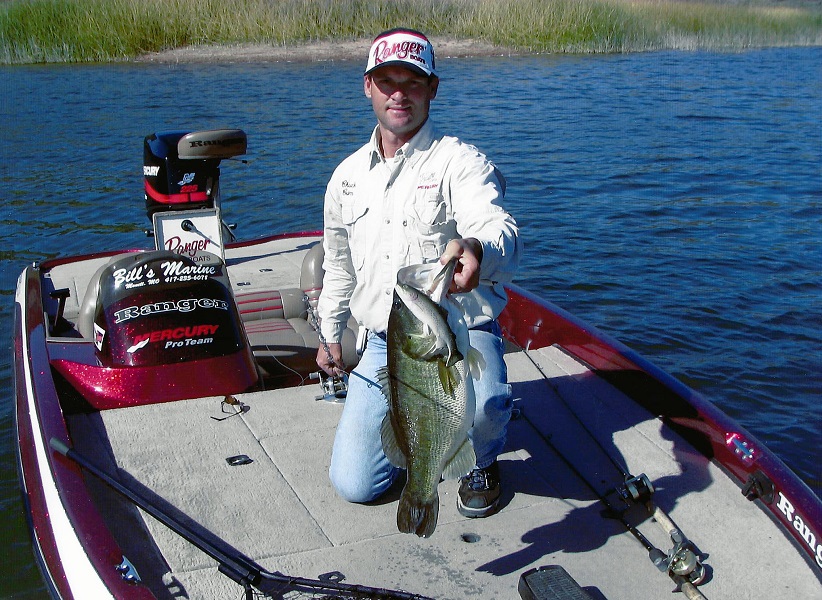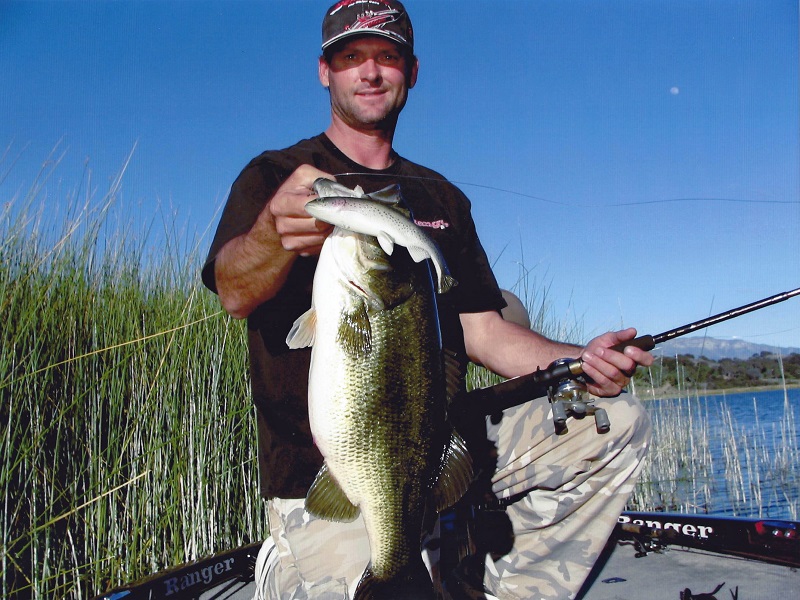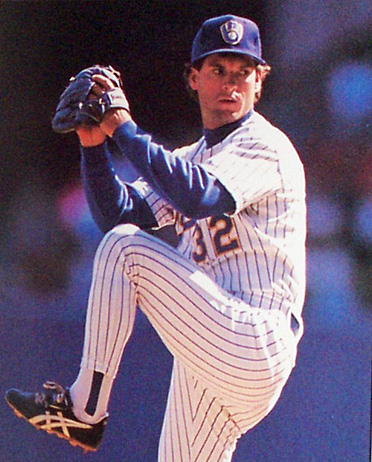Baseball fans who have taken the time to research Dodger bullpen coach Chuck Crim’s 8-year MLB career are well aware that he was an outstanding relief pitcher for the Milwaukee Brewers, California Angels and Chicago Cubs. In fact, Crim led the majors in appearances in both 1988 and 1989 with 70 and 76 appearances respectively while with the (then) American League Brewers earning him the prestigious Sporting News “Top Set-Up Man” award in consecutive seasons. Crim posted a career 47-43 mark with a very impressive 3.83 career ERA.
But what very few fans realize is that the Southern California native also participated in another professional sport after hanging up his spikes in 1995; a sport that he says he is every bit as passionate about as baseball – professional tournament bass fishing.
Being from Southern California myself and having also fished professionally, and also having administered local team tournaments in the area for nearly 20 years, Chuck and I occasionally crossed paths over the years but lost touch with one another when Crim left to play baseball for the University of Hawaii. Crim was later drafted by the Brewers in the 17th round of the 1982 First Year Player Draft and went on to enjoy a great baseball career.
When I learned that Crim had been promoted from his job as pitching coach for the Dodgers Double-A affiliate Chattanooga Lookouts to become the Dodgers new bullpen coach during this past off-season, I was ecstatic. Since then, Crim and I have re-connected and spend way too much time talking about the good ol’ days of fishing nearby Lake Casitas and Castaic Lake during their heyday, when near world record-size bass were being caught regularly in the late 70s and early 80s.
I recently had an opportunity to interview Crim about the glory days of bass fishing in Southern California and in Missouri, where he moved to after retiring from the game. Oh ya… we also talked a little about baseball too.
* * * * * * * *
RC: Most fans know about your baseball career but not too many know that you also participated in another professional sport, tournament bass fishing. How did that come about?
Crim: “Just the love of fishing… fishing the High Sierras when I was a kid. My dad was an Okie and he brought me up on fishing. In fact, I probably starting fishing before I started playing baseball. It’s always been a love of mine.
“When I lived out here (in Southern California) I started fishing local tournaments at Castaic Lake. When I moved to Arizona I finally started fishing WON BASS (Western Outdoor News) stuff and fished anything that I could during the winter time. That just kept going, every winter all I did was fish tournaments anywhere from California to Arizona. I just stayed in my region there. I fished as many team circuits as I could and fished the WON pro division for a while.
“After I retired from baseball I moved to Missouri because I wanted to venture into the Bassmaster-type stuff. I fished two circuits there, I fished the Bassmaster Tour and fished the Central Pro-Am tour which was actually a tougher division than fishing the Bassmaster Tour. It was kind of like fishing the local WON BASS circuit out here against the local pros who are always the toughest guys to beat.”
RC: What was your greatest professional bass fishing tournament experience?
Crim: “I won a Central Pro-Am at Bull Shoals (on the Arkansas/Missouri border). Nobody was catching fish at the time. In fact, my practices consisted of about two bites a day, which was good. I talked to a local guy who hadn’t gotten bit in eight days and he lived on the lake. I entered the tournament and went to one spot and caught a jerkbait fish, which is the bite I was on. I kept looking at a bluff end point and thought that the fish would be there in the winter time, so I went over there and started throwing a hair jig and I actually caught a fish on every cast when I first got on it. I limited out, my (amateur) partner limited out, in fact he won the amateur division and never caught a fish the second day (of the two-day tournament). I ended up catching a limit there both days and ended up winning the tournament against local guys. That was probably my best tournament.”
RC: What is the largest bass you’ve ever caught and when and where did you catch it?
Crim: “I caught a 14-2 out of the Castaic lagoon back in 1985 on a Gene Larew 6-inch brown and silver-flake (plastic) worm. I actually stuck one bigger than that at Lake Casitas. I had one on that was 18 pounds or better on a (Rapala) Shad Rap that jumped right at the boat and ended up coming off.”
RC: Since joining the Dodger organization do you still tournament fish at all?
Crim: “I just started again. I’ve got a buddy who is part of ABA (American Bass Association) out in Arizona. In fact, I took a buddy of mine, Bob Skube, who is the Triple-A hitting coach for the Milwaukee Brewers and had never fished a tournament in his life. I said ‘Skube, let’s go ahead and fish a team tournament’ and he said ‘Okay, I want to try that,’ and we went out there and ended up coming in sixth place. We actually beat (professional tournament angler) John Murray and some other pretty good fishermen out there. We had a limit by 9 o’clock and went looking for a bigger bite. One good bite and we easily could have finished in second place. It was fun and really got my competitive juices flowing again. It was really cool because Bob had never fished a tournament before.”
RC: What’s your favorite bass fishing technique?
Crim: “Probably flipping a jig. I was taught by a guy named Ron Price who was taught by a guy who you probably knew named Jim Raines. Jim really knew how to fish a jig which at the time was known as a big fish-type bait, whether fishing it deep or shallow or flipping or pitching it. I like to target fish and I fish shallower than most people do. I learned how to fish shallow when I went back to the mid-west where the lakes aren’t as deep as they are out here. And now I’ll fish shallow anywhere year round, even at Castaic and Casitas.”
RC: I recall you mentioning that you also like to fish with a Huddleston Deluxe (trout-imitating) swimbait.
Crim: “That’s my favorite bait. I got hooked on it (no pun intended). Granted, I think everybody who starts fishing with a swimbait gets discouraged with it because they don’t get a lot of bites. I wish I got my fist swimbait fish right away because I probably would have gotten into it quicker. In fact, I was having a tough day at Casitas one time and I decided that I was just going to throw a Huddleston the rest of the day. I put all of my other rods away in the rod locker and had one Huddleston out and threw it the rest of the day. Finally about 4 o’clock I got my first bite and after that I was hooked. It was about a 7 1/2 pound largemouth. Just the rush of having a fish like that eat that bait on 25 lb test fluorocarbon line on a big rod and just about ripping the rod out of your hands, there’s nothing like it. After that I was religious with it and started regularly catching 8 to 10 pounders on it. So now when I go to Casitas or a lake like that I’ll throw it all day.”

Crim’s favorite bait for catching largemouth bass is a Huddleston Deluxe trout imitating swimbait. He has caught several bass over 10 pounds on the bait including this 10 lb 8 oz Lake Casitas beauty, which he released after this photo was taken.
RC: Many years ago when I was still guiding, I took Pittsburgh Pirates pitchers Zane Smith, Randy Tomlin and catcher Tom Prince fishing a couple of times and I noticed that they were extremely proficient at casting. Did you find that your fishing experience helped you in baseball and your baseball experience helped you in fishing with eye-hand coordination?
Crim: “Oh without a doubt. I think a lot of it too is being articulate. I was always articulate about the pitches I threw so I got to where I was pretty articulate about what I did with my fishing; anywhere from the baits that I make, anywhere from pouring my own worms – I’d throw five worms out and I’d keep one because that was the one that was perfect. I think it definitely adds up to the other.
“I used to practice in my room at night flipping a jig into a cup just so I would be good at it and be able to hit that one sweet spot.
“I think it’s more of a competitive-type nature to make yourself better than anything. I fish for the bite rather than fishing for the fish. People think that you go fishing to catch the fish but I’m more intrigued with the presentation (of the bait) and the bite than I am with catching the fish now. The accomplishment of relying on your instincts and making the right cast and locating fish, there’s so much more involved than just going out there and chunking and winding.”
RC: When my kids were young I used to take them fishing with me quite often. Did you take your two sons fishing with you at all?
Crim: “My older son Cody (26) loves to go fishing with me. This past off-season before spring training started I took him out with me and we hammered the stripers at Lake Pleasant (north of Phoenix). It was a lot of fun watching him catching fish. When he was old enough, he was five or six, we would fish father/son tournaments on Table Rock Lake every year. It was one of my favorite tournaments every year because I got to fish it with him. He liked it because we won money and I would split it with him.
“My youngest son Jacob (12) not being around it as much as my older son was (because of the long baseball seasons) isn’t really into it like Cody was. Cody really enjoys going fishing with me now.”
RC: I guess I should ask you a few baseball questions too. Having pitched in the major leagues for eight seasons, what was your greatest baseball experience?
Crim: “Without a doubt my rookie season in 1987. I got to enjoy our 13-0 season start and we were 21-3 at one time. I ended up getting two of those wins during that stretch. As a rookie it was unbelievable to experience that. I got to experience Paul Molitor’s 39-game hitting streak, I got to see Juan Nieves’s no-hitter.
“I led the league in appearances a couple years in a row which was a feat for me. I was considered the best set-up man in baseball for three years and that was another accomplishment for me.
“I appreciated every day I was in the big leagues, I really did. I enjoyed what I did, I loved… you can’t really even consider it a job, although it becomes a job when you have to leave your family as much as you do and you have to start dealing with that part of it, but to be able to play a game for a living I mean you can’t beat it.”
RC: When you finished your eight-year career you had a record of 47-43 and an ERA of 3.83. Do you think you could have continued?
Crim: “Without a doubt. The strike was very disheartening in 1994. The thing is Milwaukee wore me out, which is fine because that was my job. I pitched more than anyone in baseball so I understand, but it started to take its toll on my arm. We didn’t have the facilities like we have now to be able to re-hab that kind of stuff and the Angels ended up releasing me halfway through the 1993 season. I re-habbed my shoulder the whole rest of that year and I came back with the Cubs in 1994.
“I had a good year with the Cubs. I only had a couple of bad games that brought my ERA up but I carried a two ERA for a long time, I carried a one ERA for two months and had a good year with them and then we had the strike. I worked out that winter and had the best stuff of my whole career since the start of my career, I had like a second wind.
“The strike was disheartening, I was tired of leaving my family, I wanted to have my sons enjoy what I enjoyed when I was young, so it was easy for me to actually leave at that time. I had time in already, but I could have stayed, I can still throw a baseball. I definitely feel that I could have pitched until I was at least 40 but I never got to do that.
“That’s one mistake I made, I never let the game tell me that I couldn’t play anymore, I kind of told myself to go ahead and quit and I have to live with that decision for the rest of my life. But good things happened after that, I got to experience another dream of mine (with professional bass fishing), but as far as baseball goes, ya, I could have kept pitching.”
RC: After you left baseball what did you do?
Crim: “I moved to Missouri and fished professionally for seven years. After that I came back (to Southern California) and became the head coach at Canyon High School (in Santa Clarita, CA). I jumped right into to that, I got lucky because Adam Schulhofer, the head coach there, ended up leaving and he recommended me for the job. I was actually the first non-teacher to have that job and was the head coach for three years and that drove me into pro ball.”
RC: After being the pitching coach for Double-A Chattanooga for two year, what was it like getting the call-up to become the Dodgers new bullpen coach?
Crim: “Ned (Colletti) came in about halfway through my first year in Chattanooga and offered me a two-year contract and my second year would be a big league contract. When I entered my second stage in professional baseball knowing what goes on, knowing expectations, I told myself that I’m going to do the best I can do and let the game take me wherever it wants to take me, and that’s all I’ve done.
“I wasn’t after anybody’s job, I wasn’t fighting for anything, I was just fighting to get my kids (players) to do well every day, and this was the repercussion of everything… me just going out there and loving what I do, attacking each day, attacking the moment and I love helping those kids develop, I love to help those kids fulfill their dreams and see the success in them, and their success brings my success. All of my thanks go to my pitchers because if they didn’t respond and didn’t have the aptitude, I wouldn’t be here right now.”




 July 17th, 2013 at 6:00 am
July 17th, 2013 at 6:00 am  by Ron Cervenka
by Ron Cervenka 

 Posted in
Posted in 

“All of my thanks go to my pitchers because if they didn’t respond and didn’t have the aptitude, I wouldn’t be here right now.” That says it all.
Good variety of questions Ron. Also VG answers Chuck. Chuck has a great perspective on things.
Interesting side line he has – bass fishing. Huh! He toured professionally for seven years. Is it possible to make a living in professional fishing?
I have his autograph. Wonder it TBW has?
Chuck is a great guy and very highly thought of by his players.
It is possible to make a living in professional bass fishing, primarily through sponsorship endorsements. But to get to that level, you have to be very successful on a regular basis, which is very difficult to do.
I went to high school with him. He was in my English class with Ms. Mays I think her name was and I kind of had a crush on him. LOL. Some people are very lucky/blessed though I’m sure he had to work to be good at it but it always helps when you love what you do. I know no one has a perfect life but wow. He is very lucky.
Chuck Crim is a man of integrity, dedication,and carries high standards with values to pursue what
he sets out to accomplish. From Major League Baseball to Pro Bass Angler, Chuck is the best.
Chuck has guided me with patience and “major league” knowledge to become a woman who absolutely loves the sport of fishing. He is the “Real Deal”
Grateful Thankful Blessed.